Intro
Discover top potassium rich foods, including bananas, leafy greens, and sweet potatoes, to boost heart health and reduce blood pressure with essential electrolytes and nutrients.
Potassium is an essential mineral that plays a crucial role in maintaining various bodily functions, including heart health, blood pressure, and bone density. Despite its importance, many individuals fail to consume sufficient amounts of potassium-rich foods, leading to potential health issues. In this article, we will delve into the significance of potassium, its benefits, and explore the top potassium-rich foods that can help you meet your daily requirements.
Adequate potassium intake is vital for maintaining proper muscle and nerve function, as well as regulating fluid balance within the body. Potassium helps to counterbalance the effects of sodium, reducing blood pressure and the risk of cardiovascular disease. Furthermore, potassium is essential for bone health, as it helps to regulate calcium metabolism and prevent the loss of bone density. With the numerous benefits of potassium, it is essential to incorporate potassium-rich foods into your diet to maintain optimal health.
The recommended daily intake of potassium varies based on factors such as age, sex, and overall health. Generally, adults require around 4,700 milligrams of potassium per day. However, many individuals fail to meet this requirement, with some studies suggesting that up to 98% of adults do not consume sufficient amounts of potassium. This deficiency can lead to a range of health issues, including fatigue, muscle weakness, and heart palpitations. By incorporating potassium-rich foods into your diet, you can help to mitigate these risks and maintain optimal health.
Introduction to Potassium-Rich Foods
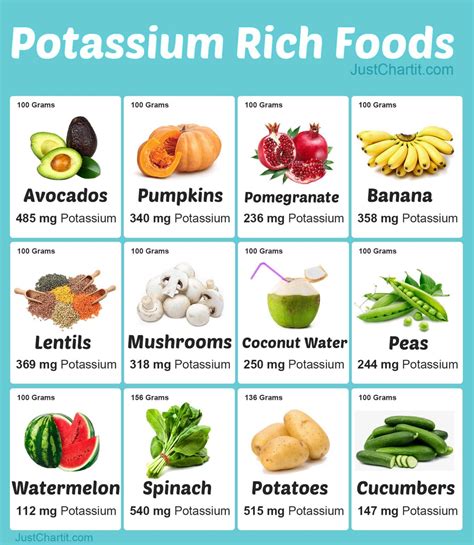
Potassium-rich foods can be found in a variety of sources, including fruits, vegetables, whole grains, and lean proteins. Some of the richest sources of potassium include leafy greens, such as spinach and kale, as well as fruits like bananas and avocados. Legumes, including white beans and lentils, are also excellent sources of potassium. By incorporating these foods into your diet, you can help to meet your daily potassium requirements and maintain optimal health.
Benefits of Potassium-Rich Foods
The benefits of potassium-rich foods extend beyond maintaining adequate potassium levels. These foods are often rich in other essential nutrients, including fiber, vitamins, and minerals. A diet rich in potassium-rich foods can help to support overall health, reducing the risk of chronic diseases like heart disease, type 2 diabetes, and certain types of cancer. Furthermore, potassium-rich foods can help to support healthy digestion, promote feelings of fullness and satisfaction, and even support weight management.Top Potassium-Rich Foods
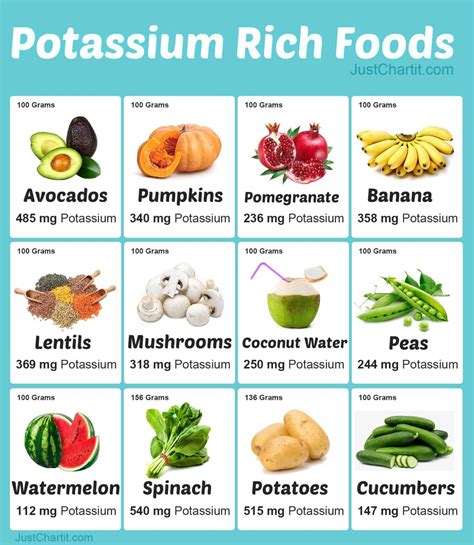
Some of the top potassium-rich foods include:
- Leafy greens, such as spinach and kale
- Fruits, like bananas and avocados
- Legumes, including white beans and lentils
- Whole grains, such as brown rice and quinoa
- Lean proteins, like salmon and chicken
- Nuts and seeds, including almonds and pumpkin seeds
These foods can be incorporated into your diet in a variety of ways, including:
- Adding leafy greens to salads and smoothies
- Snacking on fruits and nuts
- Incorporating legumes into soups and stews
- Using whole grains as a base for meals
- Grilling or baking lean proteins for a healthy dinner option
High Potassium Foods List
Here is a list of high potassium foods, along with their respective potassium content per serving: * Spinach (1 cup cooked): 840 milligrams * Banana (1 medium): 422 milligrams * Avocado (1 medium): 708 milligrams * White beans (1 cup cooked): 1,189 milligrams * Lentils (1 cup cooked): 731 milligrams * Brown rice (1 cup cooked): 442 milligrams * Quinoa (1 cup cooked): 563 milligrams * Salmon (3 ounces cooked): 534 milligrams * Chicken (3 ounces cooked): 356 milligrams * Almonds (1 ounce): 718 milligrams * Pumpkin seeds (1 ounce): 588 milligramsPotassium Deficiency and Its Effects
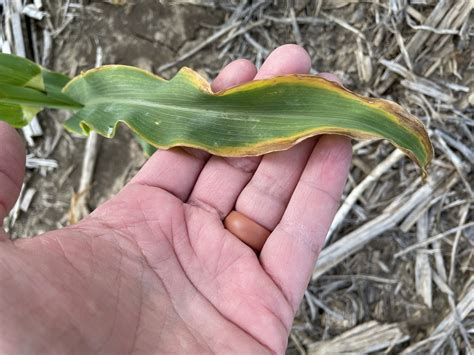
A potassium deficiency, also known as hypokalemia, can occur when the body does not have enough potassium. This can be caused by a variety of factors, including a poor diet, certain medications, and underlying medical conditions. Symptoms of a potassium deficiency can include:
- Fatigue and weakness
- Muscle cramps and spasms
- Heart palpitations and arrhythmias
- Constipation and abdominal cramping
- Bloating and water retention
If left untreated, a potassium deficiency can lead to more severe health issues, including:
- Respiratory failure
- Cardiac arrest
- Muscle paralysis
- Rhabdomyolysis (a condition in which muscle tissue breaks down)
Treating Potassium Deficiency
Treating a potassium deficiency typically involves addressing the underlying cause and incorporating potassium-rich foods into the diet. In severe cases, potassium supplements may be necessary. However, it is essential to consult with a healthcare professional before taking any supplements, as excessive potassium intake can also be harmful.Potassium-Rich Foods for Athletic Performance
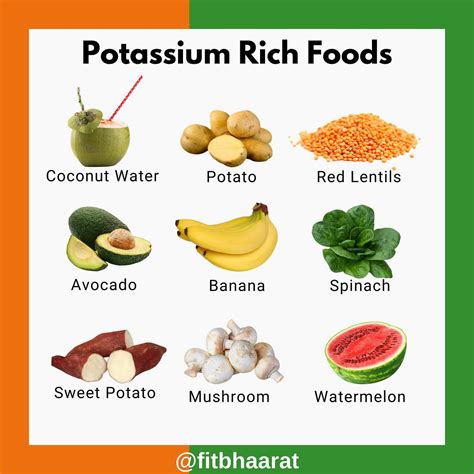
Potassium-rich foods can be particularly beneficial for athletes and individuals who engage in regular physical activity. Potassium helps to regulate fluid balance and support muscle function, reducing the risk of cramping, spasms, and fatigue. Some of the best potassium-rich foods for athletes include:
- Bananas
- Avocados
- Nuts and seeds
- Dried fruits, such as dates and apricots
- Coconut water and sports drinks
These foods can help to support athletic performance by:
- Reducing muscle cramping and spasms
- Improving endurance and stamina
- Supporting hydration and fluid balance
- Aiding in recovery and reducing muscle soreness
Best Potassium-Rich Foods for Athletes
Here are some of the best potassium-rich foods for athletes, along with their respective potassium content per serving: * Banana (1 medium): 422 milligrams * Avocado (1 medium): 708 milligrams * Almonds (1 ounce): 718 milligrams * Dates (1 cup pitted): 964 milligrams * Coconut water (1 cup): 600 milligramsConclusion and Final Thoughts
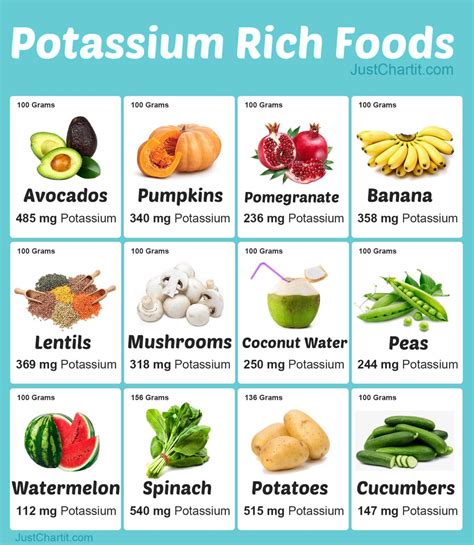
Incorporating potassium-rich foods into your diet can have a significant impact on overall health and well-being. From reducing the risk of chronic diseases to supporting athletic performance, potassium-rich foods offer a range of benefits. By understanding the importance of potassium and incorporating these foods into your diet, you can help to maintain optimal health and support your body's functions.
We encourage you to share your thoughts and experiences with potassium-rich foods in the comments below. Have you noticed any benefits from incorporating these foods into your diet? Do you have any favorite potassium-rich foods or recipes? Share your stories and help to support others in their journey to optimal health.
What are the benefits of potassium-rich foods?
+Potassium-rich foods offer a range of benefits, including reducing the risk of chronic diseases, supporting athletic performance, and maintaining optimal health.
What are some of the top potassium-rich foods?
+Some of the top potassium-rich foods include leafy greens, fruits, legumes, whole grains, lean proteins, and nuts and seeds.
How can I incorporate more potassium-rich foods into my diet?
+You can incorporate more potassium-rich foods into your diet by adding leafy greens to salads and smoothies, snacking on fruits and nuts, and using whole grains as a base for meals.
